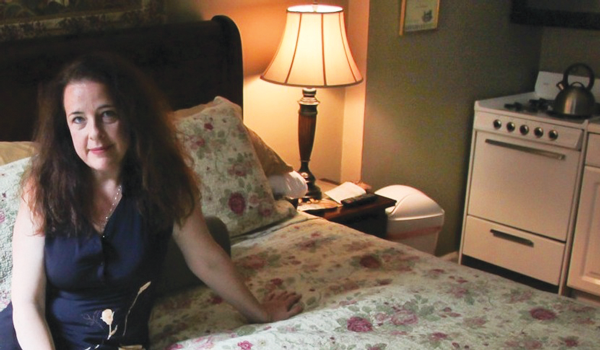
BY HANA RASKIN | This past fall, East Village Bed & Coffee, a bed-and-breakfast on Avenue C between E. Seventh and Eighth Sts., was shut down after 16 years at the location. Owned by Anne Edris, a neighborhood resident for almost three decades, the guesthouse offered visitors a “home away from home,” and the opportunity to experience the neighborhood and city in a unique way.
Edris’s understanding of and care for her guests was evident from the thoughtful FAQ page on the place’s Web site, where she shared that she offered earplugs and ambient white-noise machines upon request for guests bothered by New York’s nighttime din.
She also addressed other concepts and customs that might confuse foreign guests: such as the fact that our subway map is not to scale, the difference between avenues and streets, and tipping customs.
Edris’s bed-and-breakfast was closed down due to a strict law that went into effect May 2011 in an attempt to crack down on short-term rentals, such as Airbnb, and illegal hotels. The law prohibits stays of less than 30 days in Class A buildings — multiple-dwelling buildings that are generally permanent residences.
Unfortunately, the law took legitimate bed-and-breakfasts like Edris’s — that pay taxes — along with it as collateral.
Another operator, Vinessa Milando owns Ivy Terrace Bed and Breakfast in Midtown East. She started the business in 1998 because she felt that, while New York City can be an expensive and intimidating place to visit for may people, she could provide an alternative by offering visitors “warm, friendly hospitality and a beautifully decorated place.”
In 2011, Milando founded Short Term Alternatives for You NYC (StayNYC) in response to the increasing crackdown against the city’s bed-and-breakfasts. StayNYC members — mostly minority- or women-owned businesses — are all licensed New York City “small-facility operators.” They collect and pay the New York City hotel tax, occupancy tax, city and state sales tax, and operate in small buildings that are exclusively used as bed-and-breakfasts, with less than 10 rooms.
According to StayNYC, its members are seeking an exemption to the law to allow “a specific class of small-facilities operators in New York City to remain accepted, legal, taxpaying small businesses.”
However, while many legislators seem to agree that these well-run, tax-compliant bed-and-breakfasts were not the legislation’s intended targets, the regulation has yet to be amended and the situation has not improved.
The Villager profiled Milando and the StayNYC members’ struggle in August 2013. Since then, she said, “More mom-and-pop B&B’s have shuttered their doors,” due to fines and violations or simply out of fear of their imminent shutdown.
“Others have chosen to be far less visible, or changed how they operate in order to avoid fines and violations,” she said.
Rather than offer hope, Bill de Blasio’s becoming mayor meant a significant administration change, with many supporters in the Bloomberg administration with whom StayNYC had developed relationships moving on to other jobs.
“In many ways, we had to start over,” Milando said.
Though StayNYC has lost many of its members, Milando and the B&B operators are fighting on. They continue to meet with Department of Buildings officials and local legislators to explain the law’s crushing impact on them.
StayNYC has an online petition — addressed to the state Senate and Assembly and Governor Cuomo — urging that New York City B&B’s be allowed to keep operating. The petition can be found at https://www.staynyc.org/getinvolved.htm .































